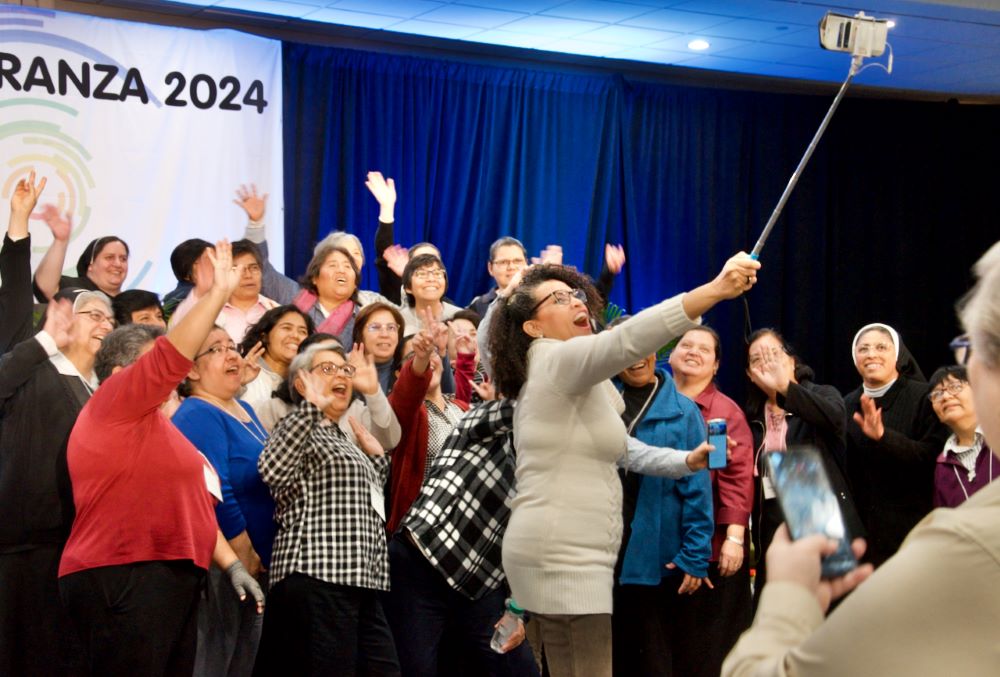
Participants in the Leadership Collaborative's Hope-Esperanza Conference take a group selfie Jan. 27 in Chicago. About 250 women religious under 65 gathered in person and virtually Jan. 25-28 to discuss, discern and embrace the future of religious life. (GSR photo/Dan Stockman)
Editor's note: "Evolving Religious Life," a new series from Global Sisters Report, is exploring how Catholic sisters are adapting to the realities of congregations in transition and new forms of religious life. While we write often about these trends, this particular series will focus more closely on sisters' hopes for the future.
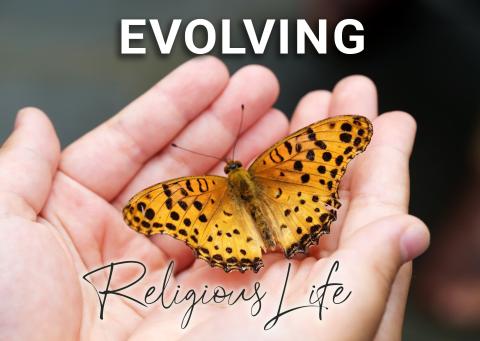
In a practical sense, nothing changed. But sister after sister at the Hope-Esperanza Conference said everything now feels different.
About 150 women religious under the age of 65 gathered in person Jan. 25-28, with more than 100 others joining them virtually, to discuss, discern and embrace the future of religious life.
Sr. Liz Dodd, of the Sisters of St. Joseph of Peace in England, said afterward that her ministry with homeless people and refugees is outcome-based, so she normally eschews gatherings that are about networking and togetherness rather than something concrete.
"But this was transformational," she said. "Somehow this conference tapped into something going on deep within me."
Part of it, Dodd said, was just gathering with hundreds of sisters her age — in England there are only two others she is aware of.
"For the first time in my religious life, I haven't felt I'm the only one doing this," she said.
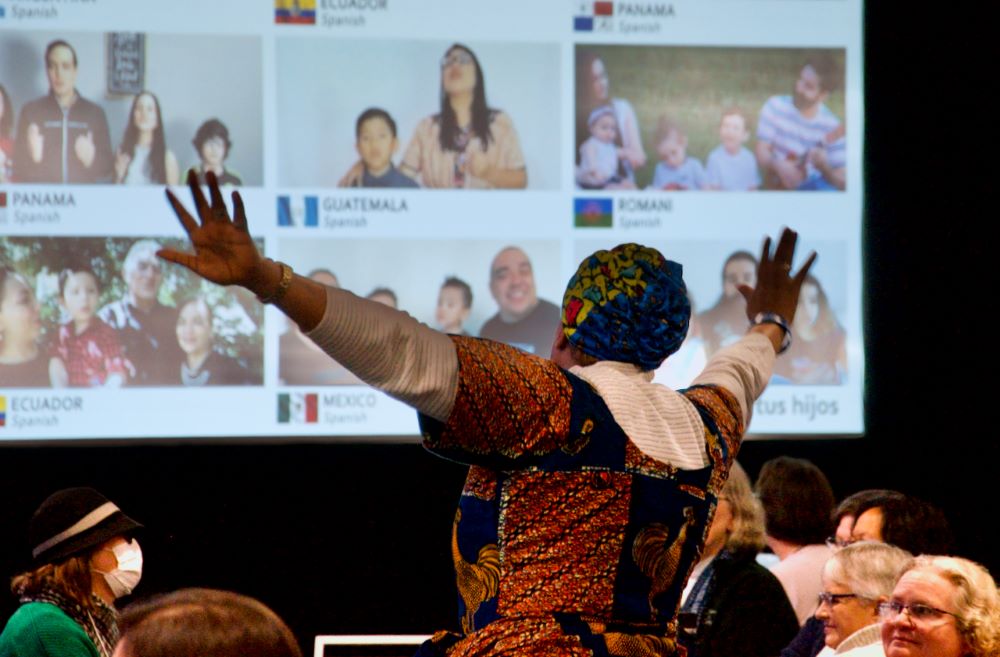
Dancers helped celebrate the opening of the Leadership Collaborative's Hope-Esperanza Conference Jan. 25 in Chicago. (GSR photo/Dan Stockman)
The gathering was hosted by the Leadership Collaborative, with additional funding by the Conrad N. Hilton Foundation, a major supporter of Global Sisters Report, and the GHR Foundation, which has provided funding for GSR in the Classroom.
Sr. Julia Walsh, of the Franciscan Sisters of Perpetual Adoration, said she learned to embrace things she thought were a problem: Being the youngest or one of the youngest in a congregation can feel vulnerable, and seeing radical change on the horizon can make you feel everything is in flux. But true leadership requires vulnerability and willingness to let the Spirit lead, even when the destination is unknown.
"The question of how are we willing to be disturbed (by the Holy Spirit) stuck with me," Walsh said. "This was a helpful reframing for me."
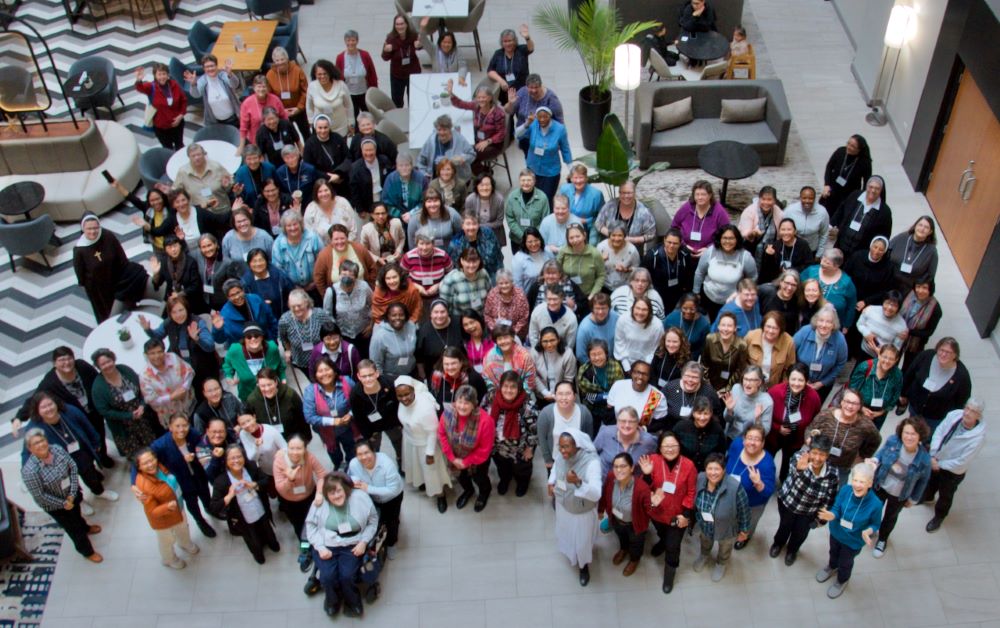
Sr. Linda Buck, a Sister of St. Joseph of Orange and executive director of the Leadership Collaborative, said much of what made the event so meaningful was the ability of younger sisters to see each other, to know they are not alone and that they are part of something that goes beyond congregations and borders.
"We hear about it a lot, but that true global sisterhood was concrete in the room," Buck said. "I think this age cohort, we are stepping into our own and asking, 'What is ours to do at this moment?' "
She said most think the experience of religious life is vastly different in the United States than it is in African countries or in India, but participants found that as young sisters they face many of the same issues: Hierarchical structures that feel confining, older sisters that dismiss the thoughts and opinions of younger sisters, and being forced into or kept out of leadership.
"We think we're so different, but they found we're very similar," Buck said.
Young sisters are often by far the minority in a congregation: According to statistics Leadership Conference of Women Religious officials shared at their 2022 Assembly, 8 in 10 women religious are age 70 or older.
Ugandan Sr. Mary Justine Naluggya, a canon lawyer from the Sisters of the Institute of the Immaculate Heart of Mary Reparatrix, spoke to the conference about "Ubuntu," a Bantu word meaning "I am because we are." True leadership, she said, requires that we understand we are who we are because of the group, and the group depends on the individuals that create it. It became a concept and mantra heard over and over throughout the event.
"Community builds resilience," Naluggya said. "It is the round table, the 'we,' not 'me.' "
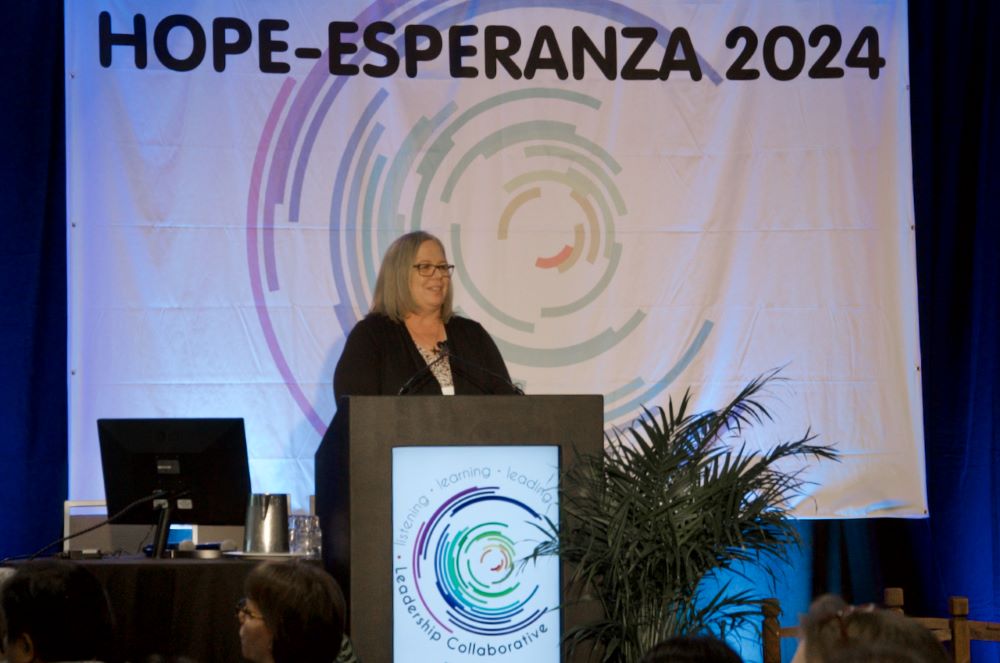
Sr. Linda Buck, executive director of the Leadership Collaborative and a Sister of St. Joseph of Orange, speaks to the Hope-Esperanza Conference Jan. 25 in Chicago. The conference allowed sisters under 65 to meet with others experiencing similar challenges in religious life. (GSR photo/Dan Stockman)
But younger sisters often feel the structure of the congregation can hinder, not help, build community.
"These structures have served us well … in meeting the needs of the time," Buck said. "But the reality is religious life is shifting, the church is shifting, society is shifting. … Are these structures we've created really our identity?"
St. Joseph Sr. Griselda Martinez Morales said even the vocabulary can diminish community. For example, the term "superior" infers that everyone else is inferior. In multicultural groups, "inclusion" means allowing minorities to leave their own spaces to join the majority, when the majority should be encompassing all spaces.
"Synodality is not a goal to reach," she said through a translator, "but a process to live daily."
Advertisement
Sr. Mary Ann Zollman, a Sister of the Charity of the Blessed Virgin Mary, is well over the age of 65, but was asked to share her wisdom with the group, which she called a great honor. Zollman served as LCWR president in 2002.
"I'm from a generation of leaders where you didn't show you were vulnerable," she said. "But the essence of leadership is vulnerability. To make space for others' gifts to shine."
The apostolic visitation, when the Vatican investigated sisters in the United States from 2008 to 2014 to ensure they were faithful, changed Zollman's view.
"The apostolic visitation showed how much we needed one another," she said. "We moved from the power of position to the power of sisterhood."








